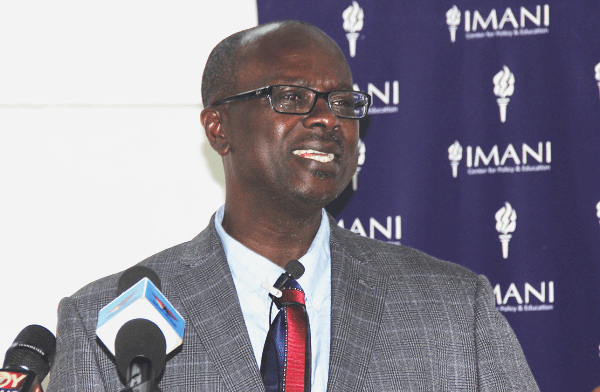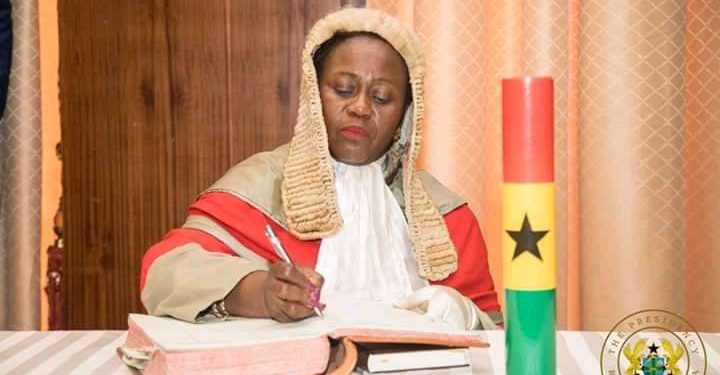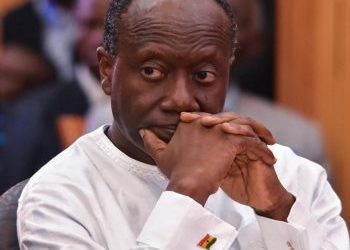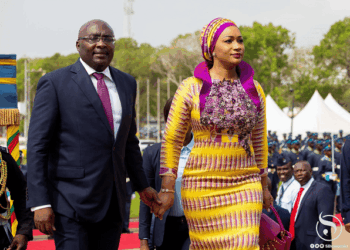Professor Stephen Kweku Asare, a D&D Fellow in Public Law and Justice at the Ghana Centre for Democratic Development (CDD-Ghana) has strongly criticized the Chief Justice of Ghana, Her Ladyship Justice Gertrude Araba Esaaba Torkornoo’s confidential request to President Akufo-Add, seeking the appointment of five judges to the Supreme Court.
The nominees according to Professor Asare include; their Lordships Edward Amoako Asante, Eric Kyei Baffuor, their Ladyships Angelina Mensah Homiah, Cyra Pamela Koranteng, and Afua Asare Botwe.
“According to the Chief Justice, His Lordship Asante has ‘provided excellent leadership as President of the ECOWAS Court and will undoubtedly be an invaluable asset to the Supreme Court’. The remaining four judges, who are currently judges of the Court of Appeal, are recommended because ‘their work has been distinguished by outstanding service, courage, and competence’.
“Article 144(2) of the Constitution provides that Supreme Court Justices shall be appointed by the President acting on the advice of the Judicial Council, in consultation with the Council of State and with the approval of Parliament”.
Professor Stephen Kweku Asare, a D&D Fellow in Public Law and Justice at the Ghana Centre for Democratic Development (CDD-Ghana)normal
Professor Stephen Kweku Asare, the renowned legal scholar and good governance advocate, in his criticisms, strongly posited that the Chief Justice’s actions undermine the constitutional framework designed to maintain the judiciary’s independence and integrity.
RelatedPosts
He emphasized that the Chief Justice is not named in the appointment process of judges to the apex court, questioning the constitutionality and appropriateness of the Chief Justice’s unilateral request.
Disruption of Constitutional Balance
Furthermore, Professor Asare argued that the Chief Justice’s actions disrupt the intended collaborative and impartial process of appointing Supreme Court Justices.
He noted that the Judicial Council, which advises the President, comprises various members, including the Attorney-General, Justices from different courts, representatives of the Ghana Bar Association, and other legal and non-legal members.
This diverse composition, Professor Asare noted is aimed to ensure a balanced and unbiased approach to advising the President, arguing that by bypassing this structure, the Chief Justice’s unilateral proposal undermines the constitutional balance and compromises the collaborative decision-making process.
Legal and Ethical Concerns
Additionally, Professor Asare indicated that the Chief Justice’s involvement in proposing nominees raises several legal and ethical concerns.
Among several reasons, Professor Asare asserted that the Chief Justice’s action could compromise the separation of powers, a fundamental principle ensuring the judiciary’s independence from the executive branch.
He pointed out that direct communications between the President and the Chief Justice can lead to reciprocal exchanges of favors, a scenario the framers of the Constitution sought to prevent.
Secondly, Professor Asare indicated that the Chief Justice may have biases or vested interests that could influence her recommendations, leading to questions about the impartiality of the nominees.
This concern, he mentioned is compounded by the unconstitutional practice of allowing the Chief Justice to determine Court Panels hearing cases, including political cases, and the recent practice of reconstituting panels.
“The framers addressed conflicts of interest in Article 284, which provides that public officer shall not put themselves in a position where their personal interest conflicts or is likely to conflict with the performance of their office’s functions. There is no conflict of interest more glaring than a Chief Justice whose hands are in the appointment, empanelling, and reconstitution of panels for the apex court”.
Professor Stephen Kweku Asare, a D&D Fellow in Public Law and Justice at the Ghana Centre for Democratic Development (CDD-Ghana)normal
Compromise of Judicial Impartiality
Highlighting the role of the Chief Justice, Professor Asare emphasized that the Chief Justice’s role is to interpret and uphold the law, not to influence the selection process of other justices.
He posited that the Chief Justice’s involvement in the appointment of judges to the apex could unduly influence the President’s decision, undermining the objectivity of the nomination process.
Professor Asare further stated that the Constitution and established protocols dictate the process for judicial nominations, and any deviation from these procedures is unlawful.
He mentioned that public confidence in the judicial system relies on the perception of fairness and impartiality, lamenting that recent surveys indicate that public confidence is at an all-time low, and the Chief Justice’s actions could further erode this confidence.

Favoritism and Partiality fuel Friction within the Judiciary
Moreover, the D&D Fellow in Public Law and Justice at the Ghana Centre for Democratic Development (CDD-Ghana) recounted that the selective naming of judges by the Chief Justice suggests favoritism or partiality, potentially introducing friction within the judiciary.
He posited that judicial ethics require judges to avoid any actions that might compromise their independence or the judiciary’s independence, emphasizing that the Chief Justice’s actions could be seen as engaging in political activities, which are generally discouraged for judges.
“An even more serious question is whether the Chief Justice’s action constitutes misconduct under the Constitution. Article 146(1) states that a Justice of the Superior Court or a Chairman of a Regional Tribunal shall not be removed from office except for stated misbehavior, incompetence, or inability to perform the functions of their office due to infirmity of body or mind.
“In my opinion, misbehavior in this context includes actions that are unconstitutional, unlawful, violate ethical standards, abuse power, and compromise the independence of the judiciary”.
Professor Stephen Kweku Asare, a D&D Fellow in Public Law and Justice at the Ghana Centre for Democratic Development (CDD-Ghana)normal
In addition, Professor Stephen Kweku Asare posited that the Chief Justice’s involvement in the nomination process of judges to the apex court represents a conflict of interest and an abuse of the influence and authority vested in the position.
He indicated that the Constitution and the Court Act prohibit the Chief Justice from participating in the nomination process, which is the sole responsibility of the Judicial Council.
The renowned legal scholar, thus emphasized that by sidestepping the constitutional scheme, the Chief Justice’s actions constitute a direct violation of the Constitution and misbehavior under Article 144.
“The Constitution and the Court Act prohibit the Chief Justice from participating in the nomination process. It is the Judicial Council, not the Chief Justice that is assigned a role in the nomination process. When it comes to the exercise of power, if it is not explicitly granted, it is forbidden.
“Therefore, sidestepping the constitutional scheme, as the Chief Justice has done, is a direct violation of the Constitution and constitutes misbehavior under Article 144. Using the position of Chief Justice to propose names for judicial appointments is an abuse of power since it bypasses the established processes for nominations that do not involve the Chief Justice qua Chief Justice. This meets the definition of misbehavior”.
Professor Stephen Kweku Asare, a D&D Fellow in Public Law and Justice at the Ghana Centre for Democratic Development (CDD-Ghana)normal
In a nutshell, Professor Stephen Kweku Asare posited that the Chief Justice’s proposal for the nomination of judges to the Supreme Court not only breaches constitutional provisions but also constitutes misconduct.
He argued that the Chief Justice’s actions undermined the principles of judicial independence and impartiality, constituted an abuse of power, and created a conflict of interest.
Such actions, he noted fall under the definition of misbehavior as outlined in Article 146(1) and therefore constitute grounds for removal.
Professor Asare stressed that adherence to established constitutional procedures is crucial for maintaining the integrity of the judicial appointment process, and any deviation by the Chief Justice should not be tolerated.










Discussion about this post